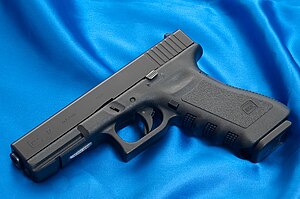Glock 19
| Glock | |
|---|---|

An early "third-generation" Glock 17
|
|
| Type |
Semi-automatic pistol Machine pistol (Glock 18) |
| Place of origin | Austria |
| Service history | |
| In service | 1982–present |
| Used by | See Users |
| Production history | |
| Designer | Gaston Glock |
| Designed | 1979–1982 |
| Manufacturer | Glock Ges.m.b.H. |
| Produced | 1982–present |
| Number built | 5,000,000 as of 2007 |
| Variants | See Variants |
| Specifications | |
| Cartridge |
|
| Action | Short recoil, locked breech, tilting barrel (straight blowback for Glock 25 and 28) |
| Muzzle velocity | 375 m/s (1,230 ft/s) (Glock 17, 17C, 18, 18C) |
| Effective firing range | 50 m (55 yd) (Glock 17, 17C, 18, 18C) |
| Feed system | Box magazine, see Variants for capacities |
| Sights | Fixed, adjustable and tritium-illuminated handgun night sights |
The Glock pistol, sometimes referred to by the manufacturer as a Glock "Safe Action" pistol and colloquially as a Glock, is a series of polymer-framed, short recoil-operated, locked-breech semi-automatic pistols designed and produced by Glock Ges.m.b.H., located in Deutsch-Wagram, Austria. It entered Austrian military and police service by 1982 after it was the top performer on an exhaustive series of reliability and safety tests.
Despite initial resistance from the market to accept a perceived "plastic gun" due to unfounded durability and reliability concerns and fears that it might circumvent metal detectors in airports, Glock pistols have become the company's most profitable line of products, commanding 65% of the market share of handguns for United States law enforcement agencies, as well as supplying numerous national armed forces, security agencies, and police forces in at least 48 countries. Glocks are also popular firearms among civilians for recreational and competition shooting, home and self-defense, and concealed carry or open carry.
The company's founder, engineer Gaston Glock, had no experience with firearms design or manufacture at the time their first pistol, the Glock 17, was being prototyped. Glock did, however, have extensive experience in advanced synthetic polymers, knowledge of which was instrumental in the company's design of the first commercially successful line of pistols with a polymer frame. Glock introduced ferritic nitrocarburizing into the firearms industry as an anticorrosion surface treatment for metal gun parts.
...
Wikipedia
